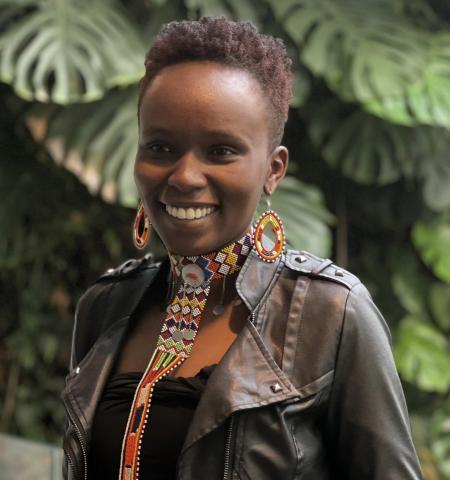Embracing Equity in Global Conservation

On International Womens’ Day, Robinson postgraduate student Ruth Jepkemoi tells us about her journey from Kenya to Cambridge.
Ruth Jepkemoi’s journey to conservation leadership started with her grandmother Tina Singen, who taught her all about the plants in the highlands of Kenya, where she grew up. Ruth didn’t follow in her grandmother’s footsteps as a herbalist but she realised that, through studying plants, she had developed a passion for conservation. At the Jomo Kenyatta University of Agriculture and Technology, Ruth and her friends set up an organization (Kang4Nature) to do clean ups, tree planting and education on conservation awareness. One of their lecturers, Dr Winnie Kiiru, saw the work that they were doing and offered Ruth a role as an Assistant Research Biologist with the organisation she was working for.
CHD Conservation, Kenya was working to educate people in rural areas of Amboseli about conservation issues. They had started to realise that the women of the community spent a lot of time in nature, collecting food, water and firewood and yet they were not included in the conservation sector. Ruth’s mentor tasked her with starting a womens’ programme in the Maasai community. In order for the programme to have real impact, Ruth decided to work with young teenage girls, making sure that they were able to attend school, and offering them support in personal development. In this way, she hoped to bring about systemic change within the community.
Ruth’s team visited households in rural communities, spoke to girls’ families, and asked if they could take them on conservation camps. The original idea was to run a programme of conservation education combined with life skills coaching, but it soon became apparent that many of the girls had a lot to teach their leaders about conservation. So the emphasis shifted to creating a space where participants’ existing skills could be recognised and properly supported.
In spite of the programme she was running in Amboseli, Ruth didn’t consider herself to be a leader at first. But soon she realised that, as well as mentoring young women, she needed to equip herself and to expand her horizons beyond Kenya. “I reached a point where we were looking at fundraising for events, getting other team members. Now how do you make this even bigger? How do you get collaborations, partnerships, all that? And then I just thought ‘I need to know what the globe is doing.’ So I came to Cambridge, to find out what the globe is doing.”
On the Masters in Conservation Leadership programme in Cambridge, Ruth found herself amongst twenty-three students from eighteen different countries. “So now I know what Costa Rica does, what Colombia does, what Zambia does - even what Indonesia does. There are some things I borrow from my colleagues in Cambridge, where I call my team back at home and say, “We can do this!” And then I look at other things and think ‘That wouldn’t work in my context. The course has given me a global view, which is really important in growing on a personal level, and on the projects that I’ve been doing.” After a term of lectures, Ruth is currently working on a consultancy project with five other students. Then from May to August she will be on a placement with Fauna & Flora International. “I’ll be looking at promoting gender transformative approaches for conservation, which really aligns with the work I’ve been doing in Kenya.”
Ultimately, Ruth’s goal is to achieve practical outcomes with her work. “It’s time for us to move from being mainstream to transformative. If you search right now ‘gender in conservation’ you find a lot of documents written about it, but I think it’s time for organisations, for us as people who speak about it, to do the work. Let’s ensure that those women who are in policymaking spaces get the chance to really be policymakers and bring about impact in conservation. Let’s give the girls in marginalised communities a chance to go to school and come and impact conservation. Let’s really do it.”
The Cambridge Masters in Conservation Leadership is a ground-breaking course that equips students with the applied leadership and management skills needed to create positive change in conservation. The Masters is hosted in the Department of Geography and delivered in collaboration with the Cambridge Conservation Initiative in the David Attenborough Building. Applications for 2024-25 will open in September 2023.